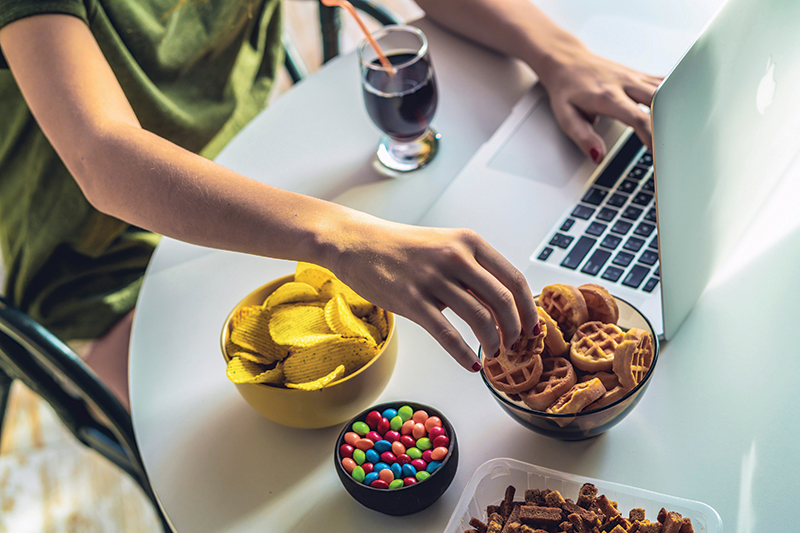Stress is one of the most common causes of overeating and weight gain. As much as you want to stop stress eating, it’s hard to control because it happens when you’re stressed. It’s not enough to tell yourself not to do it. In fact, trying NOT to stress eat can actually intensify stress and make you want to eat more.
Can you relate? Do you come home and have a glass of wine after a long, overwhelming day? Do you eat a handful of crackers while you answer e-mails? While making dinner, are you licking the utensils after you’re done with them? Much of stress eating is so unconscious that it happens automatically, and you may not even realize it. Before you can change your behavior, you need to be aware of what you are doing.
Keeping a journal can help. Write down where and when you stress eat. At first, you may be journaling after the fact, but eventually, your awareness will increase, and you will catch yourself before you stress eat. This is the goal, and you can then decide not to stress eat and do something else to cope instead.
Make a Plan—And Stick with It
It is possible to break the cycle of stress → stress eating → then more stress — with the right plan.
A plan to successfully control stress eating is not just about food. In fact, it doesn’t start with food at all. A few non-food strategies and a bit of practice can make a huge difference. It takes persistence and creative ways to calm and successfully soothe yourself.
The goal is to rewire your brain to identify certain non-eating behaviors as comforting and to use those behaviors when things start to feel stressful. If you remove stress eating from your life, you have to replace it with something. These stress-busting strategies can help you to calm down and take control.
Write a list of stress-busting strategies that can get you through your day. Here are a few simple examples:
- Change your routine. If you have stress-eating rituals that have become bad habits, try something different. Bring a healthy snack for the drive home and take a different route to avoid your favorite sweets shop.
- Move your body. Stress builds up in our bodies and creates more stress and discomfort. Stand up, move around, and go for a walk if possible. Try to create comfort in your body in ways that don’t involve eating.
- Breathe deep. It’s physically impossible to become more stressed and more relaxed at the same time. When you start relaxing — even just a bit—you reverse the cycle of growing more stressed or anxious. Close your eyes. Stare at the blackness. Slowly breathe in and out. Count each time you inhale and exhale. Continue until you get to 10.
- Enjoy nature. Nature is very grounding. After a stressful day, stand outside for a few minutes to notice the changes in the trees and your surrounding environment. If weather permits, take your shoes off and walk barefoot in the grass. Take deep breaths of the fresh air.
- Sleep. Stress is exhausting and adequate sleep is necessary to recover. Aim for at least 7.5 hours of sleep a night. You’ll be more productive and better able to focus and less likely to have cravings. Make sleep a priority.
In addition to the strategies mentioned above, there are many other ways to calm yourself without eating, such as journaling, meditation, connecting with others, distraction, guided imagery, aromatherapy, and other ways to pamper your senses. Take these techniques for a test drive first, when you aren’t craving food, so you know exactly what to do before you really need to implement them.
If you continue to struggle with stress eating, you can reach out to Grant’s Nutrition and Wellness and make an appointment for additional guidance.
Jane Grant, RDN CD-N, is a registered dietitian since 2005 and has been trained in Integrative and Functional Nutrition to address the root cause of disease and help promote optimal health. Jane is the founder of Grant’s Nutrition and Wellness in Berlin, CT. She can be reached at 860.357.2282 or admin@grantsnutriton.com.
Visit: www.grantsnutrition.com, facebook.com/grantsnutritionandwellness, and www.instagram.com/grantsnutritionandwellness.
